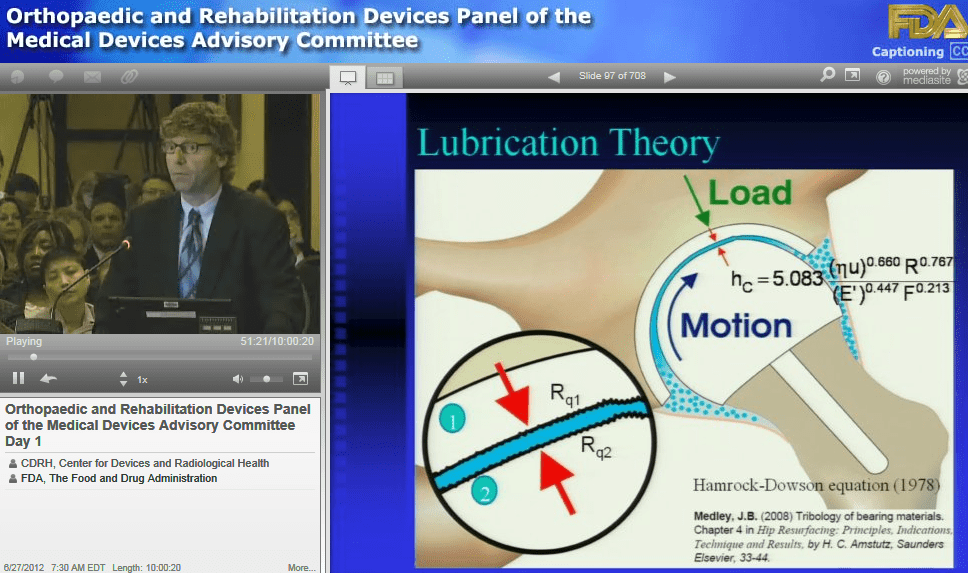The FDA’s MoM Panel
Two years ago, the Food and Drug Association (FDA) was still uncertain about how to address growing concerns over the effects of metal-on-metal (MoM) hip implants. So, on June 27, 2012, the FDA’s Orthopaedic and Rehabilitation Devices Panel convened an Advisory Committee in order to hear experts and the public voice their opinions, concerns, and recommendations regarding MoM. In the thick of the fight to gain compensation for the victims of MoM implants, looking at the actual information available to the FDA back then lends some perspective of the battlefield.
You can watch both days of the meeting for yourself here and here; however, each video is about ten hours long. For your convenience, I’ve written a (slightly) more compact summary of the information presented by the manufacturers, researchers, and physicians.
 The Agency
The Agency
The FDA kicked off the meeting with an overview of total hip arthroplasty and resurfacing. They discussed the risks generally assumed with even the most successful implants such as fracture, dislocation, nerve palsy, and implant wear, as well as some of the negative effects observed in patients with MoM implants, such as high metal ion levels, adverse local tissue reaction, and pseudotumors. Of note was the fact that not every patient experiencing these negative effects reports pain or other symptoms.
The agency then compared similarities between its responses to concerns about the MoM hip implants, and the responses of sister regulatory agencies in Australia, Canada, and the UK. In 2009, the FDA called for manufacturers to submit data on the safety and effectiveness of MoM implants. Soon after the Zimmer Durom and DePuy ASR hip systems were recalled, the agency met with professional societies and posted information to educate the public about MoM implants on its website. It also ordered hip implant manufacturers to monitor patients with metal-on-metal hips and report any findings to the agency.
The American Academy of Orthopaedic Surgeons
The FDA was followed by doctors and researchers representing the American Academy of Orthopaedic Surgeons (AAOS), the American Association of Hip and Knee Surgeons (AAHKS), the Hip Society, and the Orthopaedic Research Society (ORS).
The three speakers each presented some initial studies commissioned by the society. Paul Manner, MD from the University of Washington went over the AAOS’s review of MoM implant effectiveness, which produced no definite conclusions., He found that while some MoM implants have done poorly, others have done remarkably well. To explain the poor performances of some implant models in some patients, Dr. Manner noted it would be necessary to look further into the variables that affect long-term implant success, such as individual model design and patient age and weight.
Markus Wimmer, PhD, an expert on surface engineering from Rush University, then discussed theories that the success or failure of an individual MoM implant could be affected by factors as diverse as implant angle, metal alloy composition, contact points between implant components, or changes in pH surrounding the joint as a result of inflamed tissue. He identified the need for standardized tests to track implant success and patient sensitivity, as well as more rigorous preclinical testing of new designs and materials.
After Dr. Wimmer’s presentation, Young-Min Kwon, MD, PhD from Harvard University took the podium to present biological reactions to MoM hip implants. It is well-documented that when MoM implants corrode metal ions are released into the body. However, little evidence exists to confirm concerns that the metal ions contribute to cancer, organ failure, bone loss, or adverse local tissue response (ALTR). Dr. Kwon recommended that diagnostic evaluations and classifications of symptoms should be standardized in order to gather more reliable data on the effects of MoM implants.
Please continue on to Part Two.
Share This


